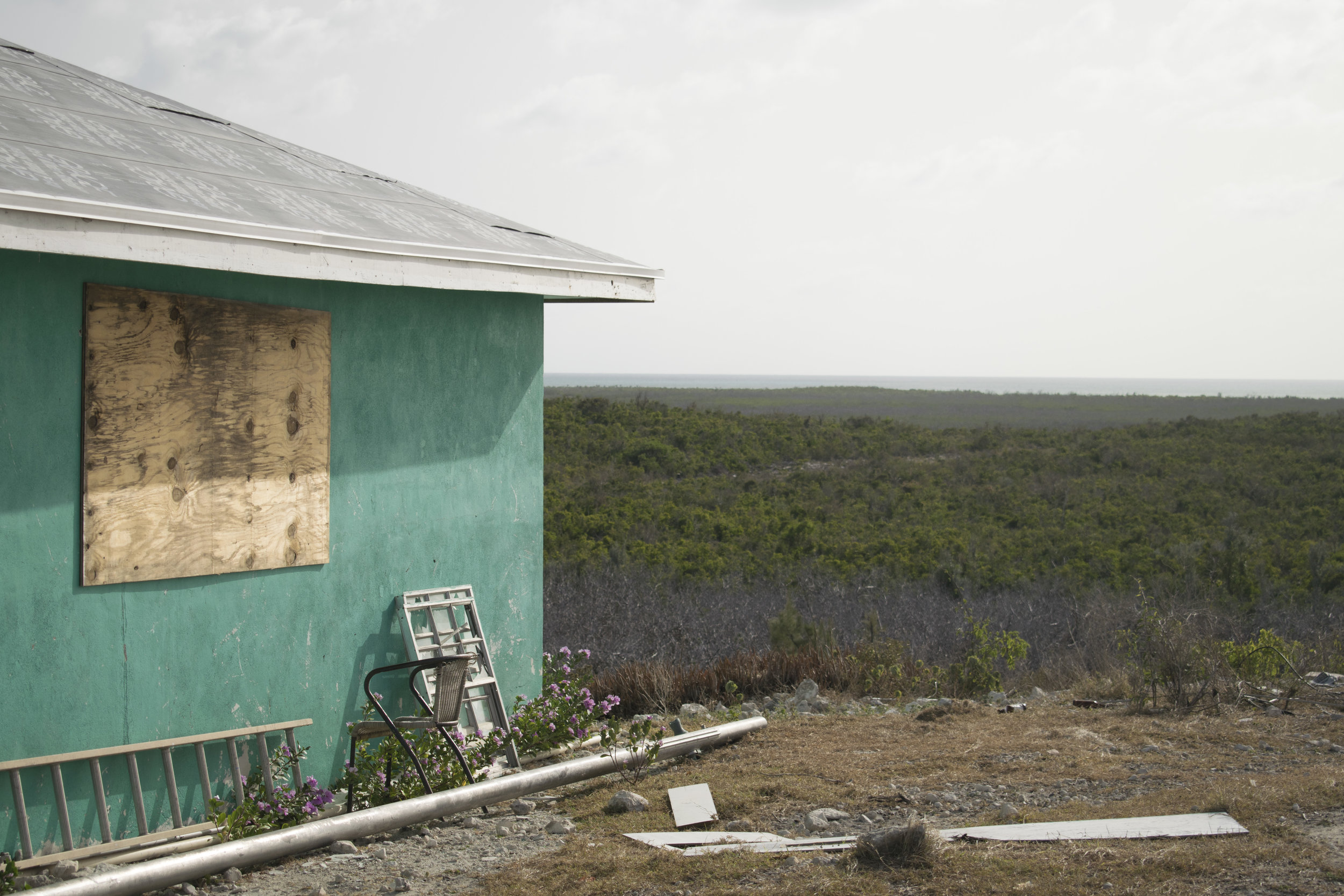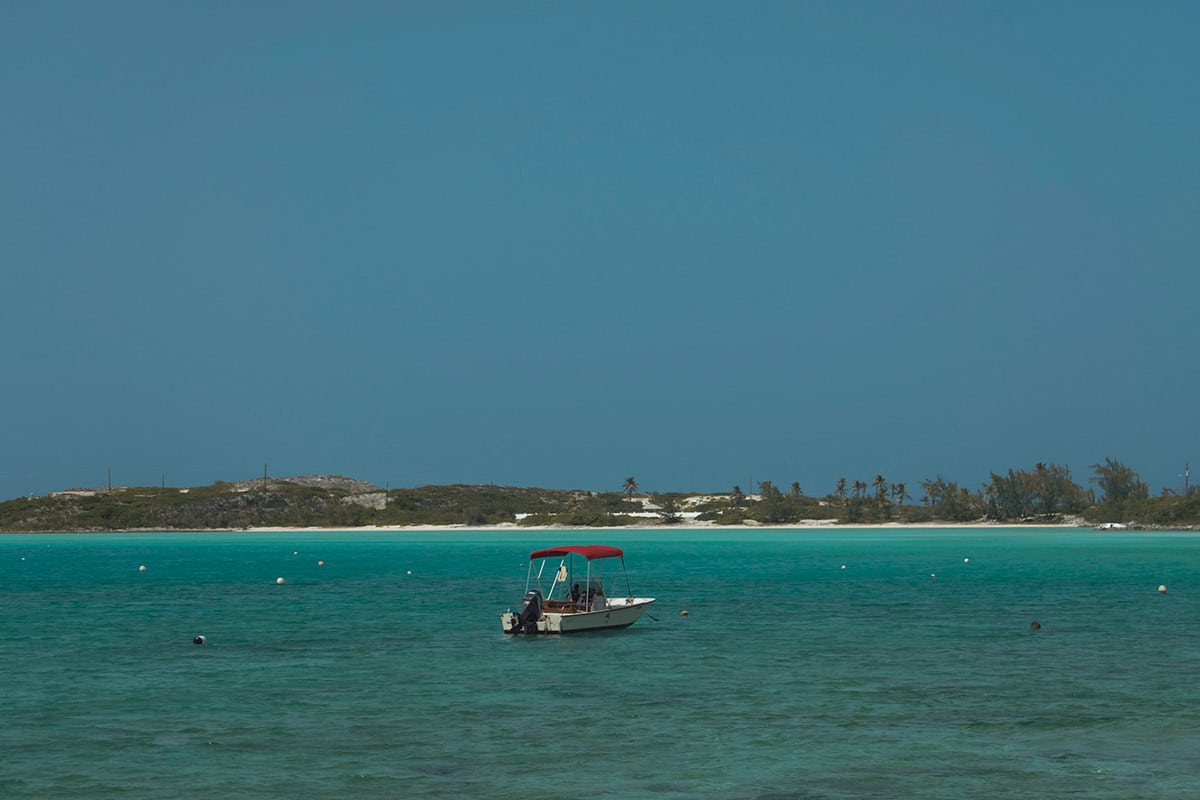
By Ethan Knowles
In the weeks following Aunty Mary’s decision to stay, a time when cement volcanos seethed on doorsteps and goats outnumbered residents fifty to one, the truth enveloped me like a vile perfume. It followed me everywhere I went, tightening my throat and summoning tears to my eyes. Even as I hauled plywood, stacked shingles, and negotiated piles of nails, it grew ever thicker and more blinding. There was no looking past it: I had been lied to my entire life.

Southwest view from Duncan Town, Ragged Island. Photo by Ethan Knowles.
It was true, Grandpa had gone to great lengths over the years to keep my mother’s affair a secret. But his efforts had swiftly collapsed over the course of one afternoon. It took but three hours for news of the reveal to come marching in like ants to every household on Ragged Island. And once all thirty inhabitants had been informed (excluding Uncle Freddy who would find out the next day upon returning from his fishing trip), they would each begin to change in unexpected ways. That is, except for Grandpa, who for some reason refused to acknowledge a word of my parents’ extramarital affair had ever escaped his mouth.
Aunty Mary, on the other hand, content that the truth had finally been revealed, initiated a new epoch in our relationship. On most evenings after the day’s work had been done, Aunty and I would stroll through town until it got dark. Sometimes we would drift aimlessly. Others, when Aunty Mary was feeling particularly adventurous, we would drop by a relative. More often than not, that meant a visit to Uncle Freddy, Aunty Mary’s younger, more upbeat brother. Without exception, Uncle Freddy offered us benny cake and beer each time we visited, a proposition that never failed to make me laugh because it was widely known that Aunty Mary never drank and, so long as I was in her company, neither did I. Much to my surprise, the news had actually made Uncle Freddy take a new interest in me – one I was deeply relieved came free of guilt and full of warmth.
By far, however, my favourite walks were the ones on which Aunty Mary told me about my mother. A glowing film would eclipse her eyes as she told me how my mother was unlike anyone she had ever met: dangerously unpredictable, inclined to disappear for hours on end without a word of notice, and shrewd, almost intimidatingly so. I cherished these descriptions and collected them like loose change, storing them away for darker times when they could be gathered up to bring relief. Something inside me knew those times would soon come.

A lone fishing boat tied down off the coast of Exuma. Photo by Ethan Knowles.
Some days later, Grandpa invited Aunty and me in his fishing boat. Pleased with our progress in repairing the house and conscious of our exhaustion, he thought it a well-deserved treat for the two of us. Grandpa was then understandably dispirited when Aunty Mary swiftly declined the offer, stating that she had been on enough boats in her lifetime and that the only one she’d ever step foot in again was the mailboat when it came time for her to return to Nassau. To me it seemed like a perfectly valid response, but I would later realize Aunty Mary’s maritime aversion was nothing more than a ploy to get me and Grandpa to spend some time alone together. Even she had noticed a rift forming between us – the rift I felt grow wider and wider inside me, the rift that reorganised my organs and applied pressure to my chest day by day. It was her hope that the open ocean would force Grandpa to confront the facts of my birth by giving him little else to focus on but me. In the end, I accepted Grandpa’s offer and, as this seemed in part to restore his zeal, began wondering what might come of our day at sea.
I abandoned all hope of reconciliation when I saw Grandpa’s fishing boat. It was a blistering day; the tar fumed under our flip flops as we made our way down to the dock – lines, bait, nets and knives all in hand. I had just rested Grandpa’s fishing pole on the first bleached plank of the dock when I looked up and saw it. I could not hide my horror. The boat’s off-white hull, once immaculate as an eggshell, had been consumed by a thick algal skin. Mobs of throbbing barnacles, tightly-packed and glued together, now swelled like boils in the slimy flesh. Meanwhile, rotten mangrove branches littered the bow, ornamented by foul berries that lay dying idly in the midmorning sun. Parched leaves blanketed the fourteen-foot interior, burying ancient animal corpses. Loathsome odours spoiled the air. Decomposers gorged themselves. But the boat, the boat was still floating.
Grandpa noted my reluctance and got straight to sweeping up the leaves. Not much could be done about the barnacles, he told me, but the algae would file away with the waves once we were at full speed. Grandpa then looked me straight in the eyes and lifted me by the hand into what moments before was the nautical equivalent to a zombie. I gazed in disbelief as the motor croaked and wheezed into the world of living, and soon enough we began navigating our way from the calm harbour at the heart of Ragged Island into open ocean.
He was careful to depart an hour or two before high tide, so as to avoid damaging the motor on the shallow banks during our return journey. Recently, many fishermen had met such a fate. Pressed to make ends meet, they would extend their fishing hours in hopes of greater profit, only to find themselves further burdened by boat repairs. Grandpa said that channel was the only employer left on Ragged Island, but it was sure to be declared functionally bankrupt by the end of the year if someone didn’t come down and dredge it up. And since the fishermen were sick of waiting for help from the government, they gradually began to accept that likelihood. They waited every day for the tide and wind to coincide; but they wouldn’t waste time waiting on a miracle.
Ethan Knowles is the NAGB attaché and is working with the collectives Expo 2020 out of the University of The Bahamas and Plastico Fantastico on this year’s Double Dutch project titled “Hot Water” set to open on Thursday, August 23rd at the NAGB. Knowles will further anchor the exhibition’s context with writings and field notes further clarifying the relationship of the environment to our humanity.